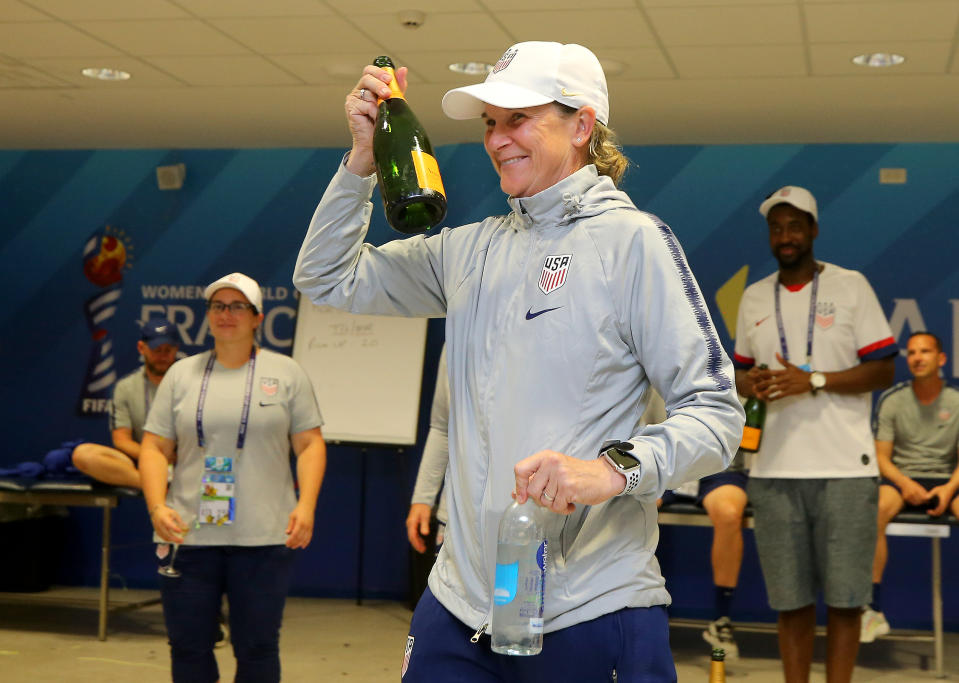Jill Ellis was vindicated at this Women's World Cup
For just about as long as she’s been the head coach of the United States women’s national team, Jill Ellis has been criticized. You have to know where to look, but it’s unmistakably there. Among the hardcore women’s soccer crowd on Twitter; on Reddit; in the comment sections underneath just about anything written about the team.
Everything Ellis does is questioned by the most ardent fans, by some of the specialized women’s soccer media even. It’s constant and all-encompassing. Player selection, lineup, formations, tactics, passing patterns, every last play on the field parsed as some kind of reflection on Ellis and all her life choices.
And now, Ellis is the first coach to win two Women’s World Cups. She has won half the World Cup trophies for a USA program that’s won more than anybody else – as many as every other country in the world combined, in fact. On the men’s side, the only coach to win two World Cups was Vittorio Pozzo with Italy in 1934 and 1938.
Ellis’ detractors might argue that she merely did what was expected of her with resources and talent most other teams at the World Cup wouldn’t even dare dream of. But that’s unfair. Ellis deserves enormous credit for the towering achievements of both her titles. Because they are separate and distinct.
Jill Ellis was vindicated at this World Cup.
But first, a quick recap of her first title. It’s mostly forgotten now that Ellis only took the team over a year before the tournament, inheriting a squad that had revolted against her predecessor and having little time before qualifiers to piece together an aging team whose playing style had plainly become stale and dated. She figured it out. She won the World Cup.
In a lot of ways, that’s when the hard work really began. Because now Ellis had to largely rebuild her team while modernizing the way it played soccer. And she had to do it while protecting herself from the notoriously flammable locker room politics, which were what tripped up former coach Tom Sermanni when he’d tried to reform things too quickly.

So Ellis experimented. And experimented some more. And then experimented still more. She cycled through endless players. She waved off a raft of veterans and long-timers who still seemed to have good years left. She brought in college players and even a high-schooler. She scoured the nation for players who would fit into her new, more technical, sophisticated system.
She built an analytics operation and doubled down on sports science. The emphasis was shifted from brawn and speed and guts to superior technique and tactics. Ellis created a team that could do different things and win in different ways.
She had to. She understood that, going back to the last time the U.S. lost a World Cup game in 2011, the rest of the world was catching up. New edges would have to be found for the top-ranked team in the world to remain on that perch.
It all showed during this World Cup.
The Americans crushed teams with their attacking in the group stage. Then they outmaneuvered a savvy Spain in the Round of 16, prevailing on a pair of penalties. They absorbed immense pressure and won on a pair of counterattacks against the mighty home team of France. It all felt very un-American, or against the team’s dominant tradition anyway, but it also worked and got the requisite results. They reverted to type against a strong England team in a tight semifinal without the injured eventual Golden Boot and Golden Ball winner Megan Rapinoe. It was a gutsy performance with a few late escapes.
And then there was Sunday’s final, where the Americans encountered an opponent known for its attacking but suddenly bunkered in with deep banks leaving virtually no paths to goal, failing for the first time all World Cup to score in the first 15 minutes. But they patiently and systematically broke down the Netherlands and found ways to reopen the flanks and unclog the middle of the field, before strolling to a 2-0 victory that felt exceedingly comfortable after Rose Lavelle bagged the second goal in the 69th minute, following Rapinoe’s penalty kick in the 61st.
It was a long and challenging tournament. Longer and more challenging, probably, than any World Cup title before it. But Ellis’s team was deep and flexible and capable of handling all of it. And nobody who watched it all and is being honest with themselves could possibly argue that the Americans didn’t deserve it, that they weren’t the best team.
It’s unclear if Ellis will stick around for another World Cup cycle – she has a contractual option through next summer’s Olympics – but her legacy as one of the greatest coaches in the sport, for either gender, is secure.
After the trophy ceremony, the usually stoic Ellis, a woman of easy smiles and liberal hugs and a razor-sharp sarcasm, had visible tears in her eyes during a TV interview. “This is just an amazing, amazing group of players but an even better group of people,” she told FOX. “And I can’t thank them enough. It’s been fantastic.”
As was to be expected in her ego-free approach, she neglected to point out that that group of players, that group of people, was the group she had put together. As part of the plan she had developed, and then executed.
Because all of this, this entire World Cup, went according to Jill Ellis’s plan.
Leander Schaerlaeckens is a Yahoo Sports soccer columnist and a sports communication lecturer at Marist College. Follow him on Twitter @LeanderAlphabet.
More from Yahoo Sports:


